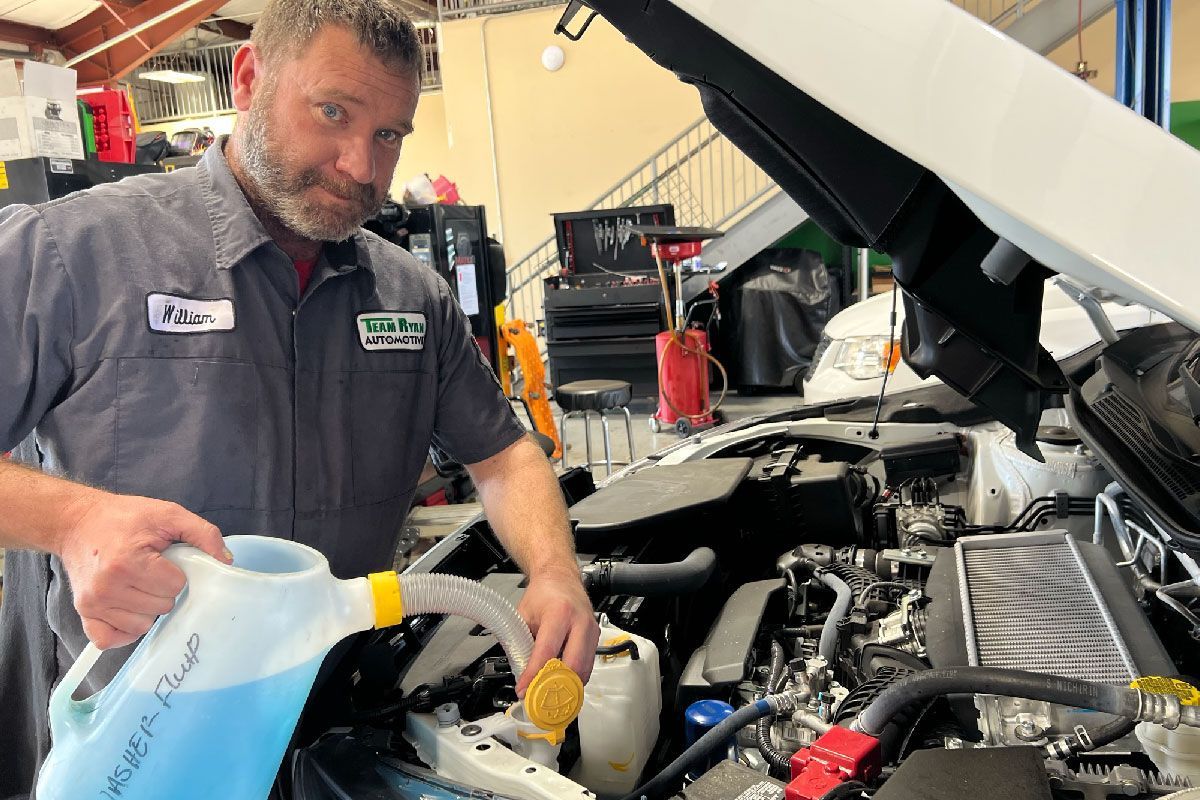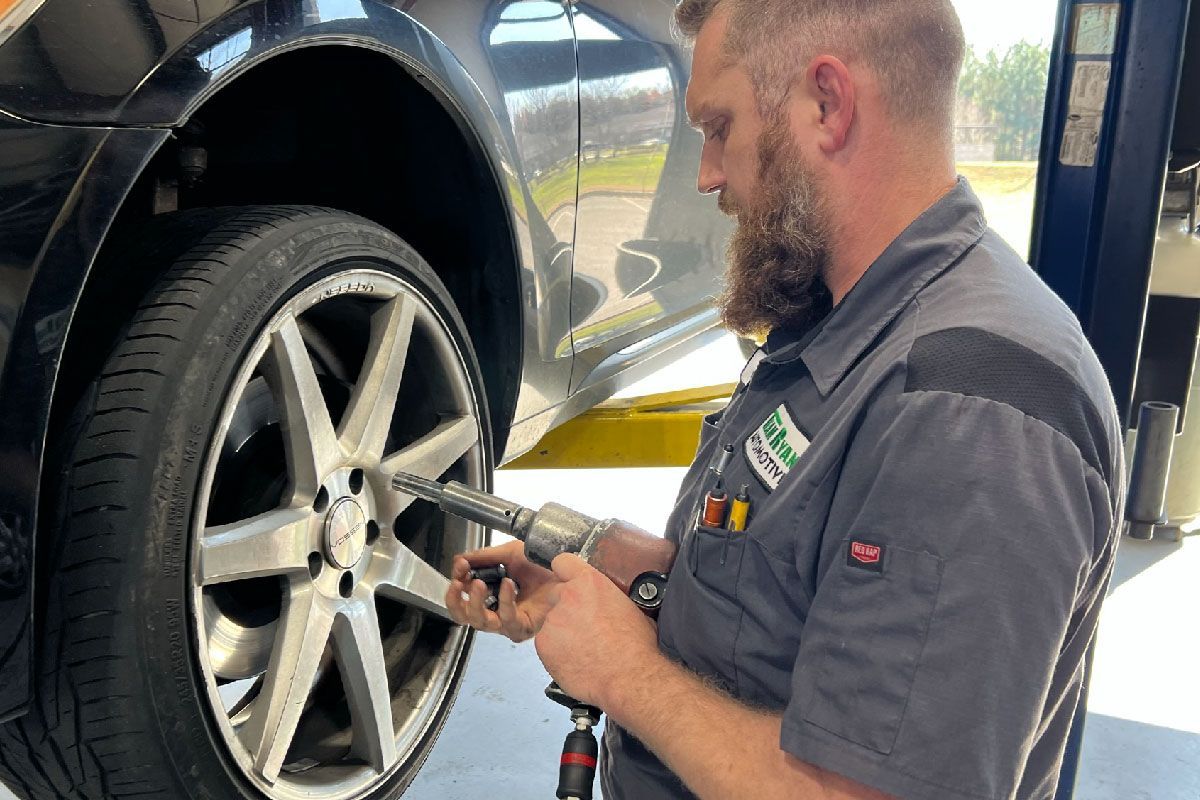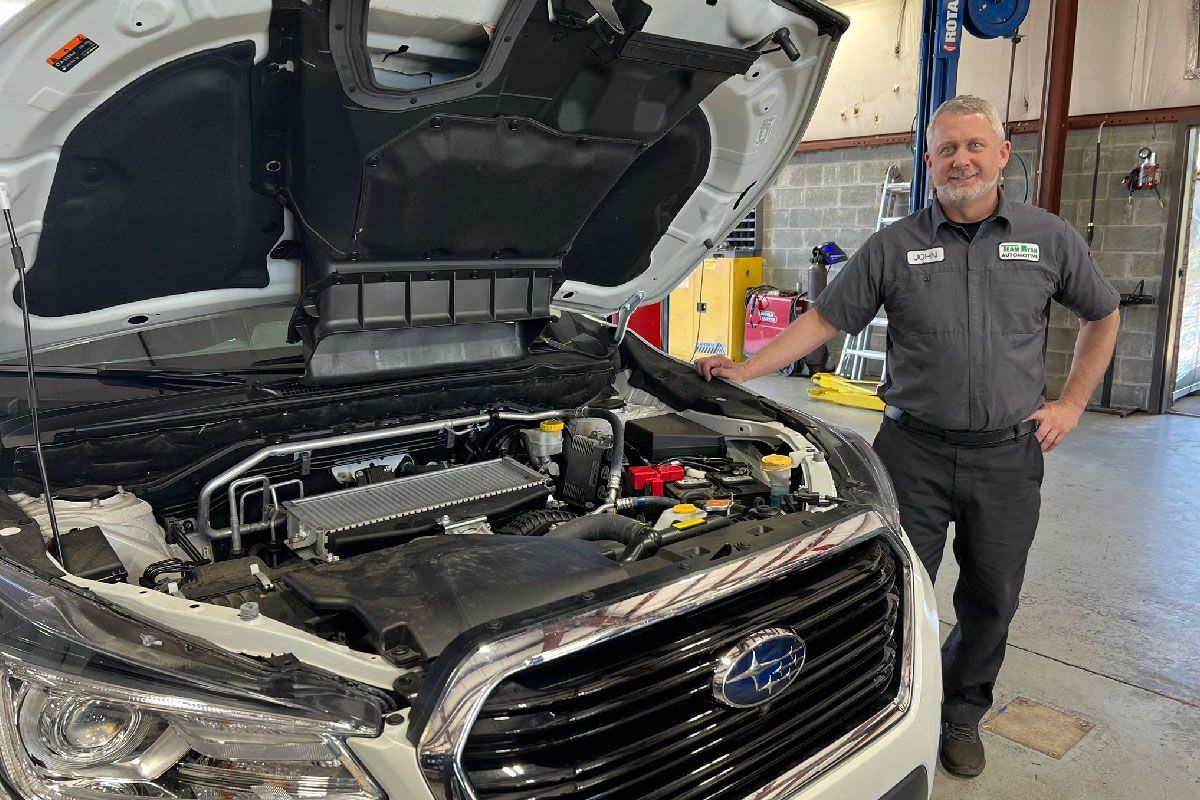Stay Cool With Team Ryan Automotive's Air Conditioning Repair Services.
Air Conditioning / AC
We live in the south, and that means hot weather during many months out of the year. With that hot weather, the AC system in your car needs to be in the best working condition. If your car’s air conditioning is not offering you relief from the heat, there is a reason why. When considering air conditioning repair, most car AC systems stop working due to a refrigerant or Freon charge problem. It could be that your car's air conditioning system has a leak and all or some of the gas has leaked out. Whether it’s an A/C condenser, A/C compressor, evaporator, hose or gasket seal that is leaking, there can’t be any leaks in your system. Our ASE certified mechanics at Team Ryan Automotive can find the cause of your car air conditioning concerns and fix it right the first time!
Air Conditioning Services
How An Automotive Air Conditioning System Works
Let’s think of your AC as your car’s refrigerator. After all, it operates in a fairly similar way, on a cycle of compression and expansion of gas or refrigerant. The evaporation from the gas offers proper cooling as the compressor turns the gas into liquid. Over time, the AC system may break from simple usage. Regular maintenance will keep your vehicle’s AC in tip-top shape!
What Our Customers Are Saying
"Very happy with Team Ryan! The transmission just started slipping and I didn't feel safe driving. We needed to have the company truck back on the road asap. The work was initiated immediately and completed in one day and done with care and professionalism! Thank you for your help and allowing us to be back in business without skipping a beat. Excellent service...Go TEAM!!"
- Viet N.
What Is My AC System Made Of?
Your AC system is made of these key components:
- Condenser
- Compressor
- Receiver/dryer
- Evaporator
- Thermostatic expansion valve
- Refrigerant
- Blower
What's Involved With A Cooling System Repair
Your vehicle’s cooling system is responsible for reducing the temperature inside your engine and preventing possible overheating. Excess heat can build in a variety of places in your vehicle’s engine. When the engine reaches maximum operating temperatures, the thermostat opens and releases antifreeze from the engine to the radiator, which initiates the circulatory flow to absorb excess heat. The antifreeze is also responsible for keeping other engine fluids from boiling or freezing. After the antifreeze flows through the engine, it cycles back to the radiator, where the excess heat escapes through the radiator’s walls. The antifreeze is cooled by the cooling fan and readied to be re-released into the engine to dissipate additional heat.
What Makes A Cars AC Stop Working
Your vehicle’s AC system may stop working for a number of reasons, but here are some of the most common reasons:
• Bad compressor
• Leaking refrigerant
• Blocked or clogged condenser
• Broken condenser
• Electrical issues
• Faulty cooling fans
Bad evaporator
Common Vehicle AC Problems
• Improper refrigerant levels
• Clutch problems
• Damp and debris-filled filters
• Refrigerant cross-contamination
• Unresponsive pressure
• Damaged compressor
• Visible leaks
• Clogged condenser
How To Know If Your Heating And A/C Need Repairs
It is important to be aware of the common warning signs for AC issues. Your car will always let you know when something is not quite right, so here’s a breakdown of how your car does that when it comes to air conditioning.
• Low or no airflow: If your vents are open and the system is on, you should be feeling cooler as time goes on. If you’re not, or you notice there’s no airflow at all, it could be for a few reasons: a possible leak, compressor issue, or broken fan. If there’s air blowing, take note of the temperature and how it feels. That information will help find the source of the problem.
• Unpleasant odor: It is possible for your AC system to trap moisture, leading to mold or bacteria developing. That will cause a damp odor to emit when the system is turned on.
• Strange noises: Any clanking or grinding sounds could indicate a loose component in your auto AC system.
A/C Refrigerant Recharge
If your cars AC system is found to be low on freon, we’ll need to first add some dye and new refrigerant in order to get the system running to find the leak. The ultraviolet dye will circulate through the air conditioning system and be forced out wherever there is a leak. Using a black light, we should be able to actually see the leak as it’s happening. Or if the leak is really small, you may need to drive it a while using the air conditioning for the leak to show itself. We can then retest the system with our dye light and also a refrigerant gas detector for those hidden areas that aren’t visible like in your dash board.
A/C Diagnosis & Repair
Another possibility is an electrical malfunction like a fuse, wiring issue or a control component has stopped working. In this case, we need to first confirm that the air conditioning system is fully charged with Freon before beginning to diagnose an electrical problem.
Electrical diagnosis can be time consuming to find the problem, and the repair cost will then be determined by what has failed. This is why it’s so important to have experienced ASE Certified mechanics working on your cars A/C system. A mechanic working on auto air conditioning systems needs to be well trained in heating and refrigeration as well as electrical diagnosis and repairs. It’s not uncommon to find both an electrical problem and an A/C recharge problem on the same vehicle. Often one of these can cause the other to happen if the system is not checked every year as maintenance. We know how to isolate these potential areas quickly and keep your cost as low as possible!
Cabin Air Filter Replacement
Another minor and often overlooked component to watch out for is your cabin air filter. This filter is responsible for trapping very small dust and pollen particles from getting into your vehicle and plugging your evaporator inside your dash, as well as causing breathing problems for you and your passengers. If this filter gets too clogged, your air conditioner won’t be able to breathe properly and the result will be very little cold air getting into your cars interior. This filter should be changed at the same time as your engine air filter, between 12,000 and 20,000 miles depending on your driving conditions.
Since the cabin air filter is hard to see sometimes, a good rule of thumb is to just have us change it every time your car reaches another 20,000 miles at most.
Why Is AC & Heating Service Important?
Because Georgia tends to get rather hot during the summertime, it is important to keep up with climate control maintenance. Much like any other vehicle maintenance, attending to it regularly can decrease the chance of larger issues with A/C or heating. This will keep you and your passengers comfortable for the long haul. So, when summer rolls around, you won’t have to worry about those last minute ice cream runs or spontaneous water park visits.
Our Heating And A/C Service Includes
Here are some key components that our typical heating and A/C service includes. It’s always important to know the expectations of what auto service and maintenance shops should be doing, so we want to outline the expectations for this service.
- Checking the interior and blower
- Inspecting the radiator coolant level, hose pipes, pressure cap, and thermostat
- Examining the compressor belt
- Checking for leaks or additional damages
- A cooling system pressure examination
- Check the interior vents
- Testing the A/C system for refrigerant holes
Benefits Of Cooling System Repair
Over time, antifreeze breaks down, loses its rust inhibition capabilities and has reduced efficiency. If not drained and replaced, old antifreeze can lead to corrosion. During a cooling system service, our staff will drain the antifreeze from the radiator, flush the cooling system, and fill the radiator with new antifreeze. The cooling system’s cooling fan circulates air through the radiator and passes excess heat out of the engine. If the cooling fan malfunctions, your vehicle’s engine will overheat usually when not moving. During an inspection of the cooling system service, our experts will check the cooling fan for damage and the fan belt if equipped for cracks. Because the radiator is responsible for cooling the antifreeze as it circulates throughout the cooling system, a leak or a broken radiator hose can lead to major engine failure. A radiator pressure test is one way we can check for potential leaks or radiator damage. Ultimately, neglecting basic cooling system and radiator maintenance can lead to a potential radiator replacement and major engine or radiator repairs down the road.
Vehicle Air Conditioning FAQ
Why Is My Car AC Running But Not Cooling?
The problem could be deriving from a few reasons: a clogged filter, cooling fan problem, leaks, or compressor issue.
How Do I Know If My Car AC Compressor Is Bad?
The typical signs of a bad compressor is: strange noises, leaking moisture, or a change in airflow or temperature.
If you’re experiencing any of these issues, bring your car over to Team Ryan Automotive, and we will make sure your AC system is back to normal.
How Do I Know If My Car AC Needs Recharging?
There are three common signs that tell you when your AC needs recharging: your AC is blowing warm air, clutch fails to engage, and visible leaks.
What Happens During A Vehicle AC Recharge?
Our ASE-certified technicians will check for any possible leaks, and if they are leaks present, the technician will repair the leak before moving on. After that, the old refrigerant will be replaced with fresh refrigerant to ensure the air conditioning will operate properly and keep you cool.
How Often Should My Car’s Air Conditioning Be Inspected?
There is no industry standard for climate control systems, so it would be best to refer to your owner’s manual for this question.
At the very minimum, it is wise to have your AC inspected once a year by a qualified technician. Especially in Georgia, the summer heat can be quite intense, meaning your air conditioning system is used a lot during that time. To ensure it is in the best working condition, professional inspections are vital.
How Do You Diagnose Auto AC Problems?
Your car will typically let you know if there’s any troubles with your vehicle’s AC system. Some of the common signs are: leaks, unusual sounds, and bad smells. If your air conditioning is not working, but you simply don’t know why, bring it in to Team Ryan Automotive. We will help narrow down a diagnostic and then take care of the problem for you!
How Do I Know If My Car’s AC Evaporator Is Bad?
Some signs that you have a faulty evaporator are: weak airflow, strange odor, compressor will not activate, or temperature varies.
If you’re experiencing any of these issues, bring your car over to Team Ryan Automotive, and we will make sure your AC system is back to proper working condition.
Team Ryan Automotive proudly serves the Air Conditioning and Cooling System Repair needs of customers in Buford, GA, Cumming, GA, Sugar Hill, GA, Suwanee, GA, and surrounding areas. If you are in need of auto air conditioning repair & recharge service in Buford and Cumming, GA, stop by Team Ryan Automotive and talk with one of our friendly and knowledgeable AC mechanics about your car’s AC recharge & repair service. Or feel free to give us a call and we’ll be happy to help you with any concerns.
Schedule Now











